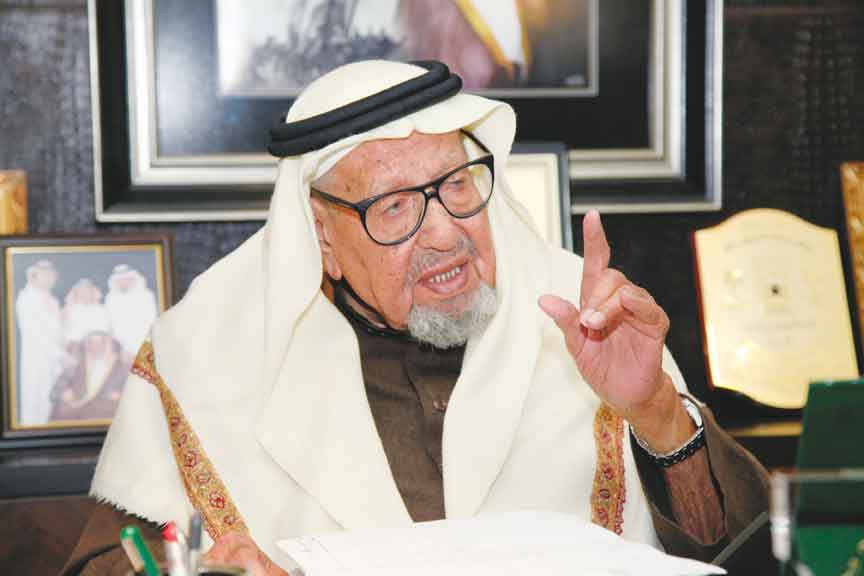The Founder
Mohammed Ibrahim Alsubeaei

Mohammed Ibrahim Alsubeaei was born in 1915 in the town of Unaizah, Al-Qassim Province, one of the oldest and most culturally advanced towns in Najd at the time. That year coincided with the now famous battle of Jarrab where King AbdulAziz AlSaoud won a landmark victory over his rival Saud Al-Rasheed.
It was a year famous on the Arabian Peninsula for having witnessed the Battle of Jarrab. Mohammed was one of Arabia’s foremost pioneers, his lineage tracing its root to the renowned Alsubeaei tribe of Al-Qassim. Mohammed’s father, Ibrahim Mohammed Alsubeaei, died in 1926 when Mohammed Alsubeaei was only 11 years old.
After his father’s death, Mohammed relocated from Unaizah to Makkah while in his early-teens to work for his uncle Nasser who had a small trading shop, and worked as a water carrier in his uncle’s house.
Mohammed spent a difficult year carrying water for his uncle to his home and his diwaniya for a paltry wage in order to support his mother and newly born brother, in addition to his work in his shop where he received eight junayhat (pounds) for 12 to 16 hours work a day for a period of 10 months.
After several months, Mohammed left the employment of his uncle in search of more profitable work so that he could play a larger role in helping his family, as well as to offset his disappointment in leaving his studies. He sought to enlist in the army but was not accepted because of his age. Instead he took work in construction in exchange for a very little salary.
Mohammed continued to endure trying circumstances, applying himself beyond his years until one of his acquaintances, Ibrahim Al-Farayh, interceded to get him a job as a supervisor in the palace of King Abdulaziz at a salary of one reformed riyal per day, the equivalent of 22 qurush. In 1930, the Minister of Finance, Sheikh Abdullah bin Sulaiman, announced the post of road inspector to scrutinize customs operations in Al-Musayjid. He decided to send seven people to do the work, with Mohammed Alsubeaei among those selected. Mohammed decided to leave his job as supervisor in the palace of King Abdulaziz to a more stable and productive job as a road inspector overseeing customs operations in the Hijazi town of Al-Musayjid, at a salary of 30 riyals a month, in addition to food, drink, and housing.
During the five years, Mohammed’s mother was concerned for her son’s safety and well-being as security, law and order were just being established in the newly founded Kingdom of Saudi Arabia. Mohammed later decided to leave his road inspector position as a result of his mother’s advice and his belief that salaried jobs did not satisfy his aspirations, and the menial tasks in which he spent five years of his life exhausted his driving energy.
In 1935, Mohammed settled in Makkah and worked in the Makkan suburb of Al-Judriyah buying and selling, and seeking a shop in which he could work. He sat down one day and calculated that his profits totaled four riyals a month – yet, after God, he was solely responsible for his family – and, furthermore, was contemplating marriage.
God came to his aid by introducing him to Sulaiman ibn Ghunaym, a Makkan merchant who was preparing to go to the Eastern Province to visit his family. Since he would be gone for six months, he was looking for a person of integrity, loyalty, and determination to oversee his business temporarily.
Mohammed’s uncle, Nasser Alsubeaei, a friend of Ibn Ghunaym, was in Makkah at the time and advised him to turn over the affairs of his small store to his nephew Mohammed, agreeing that the profits would be split equally between them. He suggested a partnership whereby Mohammed would receive the total inventory of Ibn Ghunaym’s shop, consisting of fabrics, ‘igal, and ghutras, in exchange for 950 riyals, even though it was not worth more than 500 riyals.
Mohammed nonetheless accepted these terms because he was struggling to find a job and was convinced of the importance of this partnership and determined that it would be the beginning of his rise in the world of commerce.
Mohammed, whose prime effort and his eagerness for work, began his commercial activities acquiring textile goods on consignment from Makkan merchants who knew him and his uncle Nasser, and began to deal in cloaks, ghutras, and ‘igal, and sent consignments of foodstuffs to merchants in Riyadh.
The days and months passed, until Sulaiman ibn Ghunaym returned from his trip and seeing the splendid success that Mohammed had made, decided to leave Makkah and move to Riyadh to oversee his business there, and left Mohammed to continue his successes in the shop.
Mohammed’s partnership with Sulaiman ibn Ghunaym lasted for over 28 years until ibn Ghunaym retired. They agreed that their partnership would be wound down by two friends, Sulaiman bin Ibrahim Al-Qadi and Abdullah Al-Uhali, thereby completing the liquidation of the partnership with full fidelity and clarity. Their enduring friendship continued until Sulaiman ibn Ghunaym died in 2000. It was one based on mutual trust and respect.
Mohammed was determined to build upon his experience derived from working with his uncle Nasser, partnership with Sulaiman Ibn Ghunaym and the merchants of Makkah. In 1938, Mohammed decided to invest in the field of money-changing, and established with his brother, the ‘Mohammed and Abdullah Ibrahim Alsubeaei Company for Money-Changing and Trade’.
In 1957, following the government’s move to Riyadh, Mohammed took the decision to move to Riyadh and expand his business to trade, industry, public assets, and real estate. In the words of the Mohammed, ‘In light of the move of government ministries to Riyadh, I considered expanding and opening premises in Riyadh, where I had business with some of the princes and ministers.
Mohammed was a modest man of great dignity, compassion and benevolence. He had achieved success long before Saudi Arabia prospered as a result of the discovery of oil.
On 18 August 2017AD corresponding to 26 Dhū al-Qa’dah 1438H , at the age of 104, Mohammed Ibrahim Alsubeaei passed away surrounded by his loving family, after a long life dedicated to serving God, his country and community.

